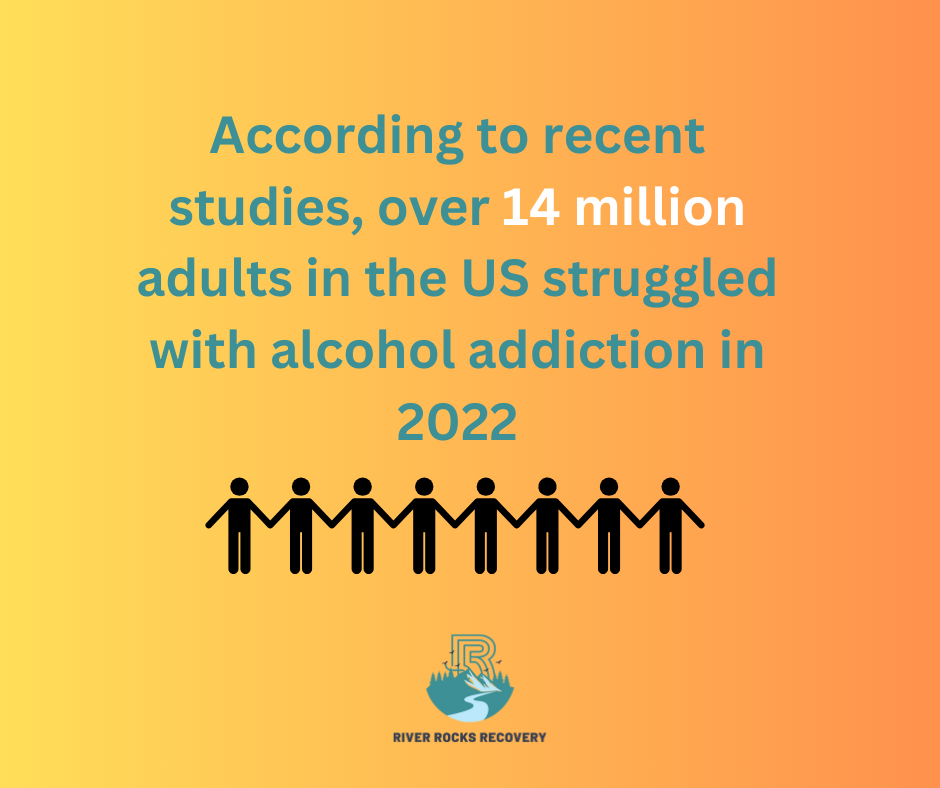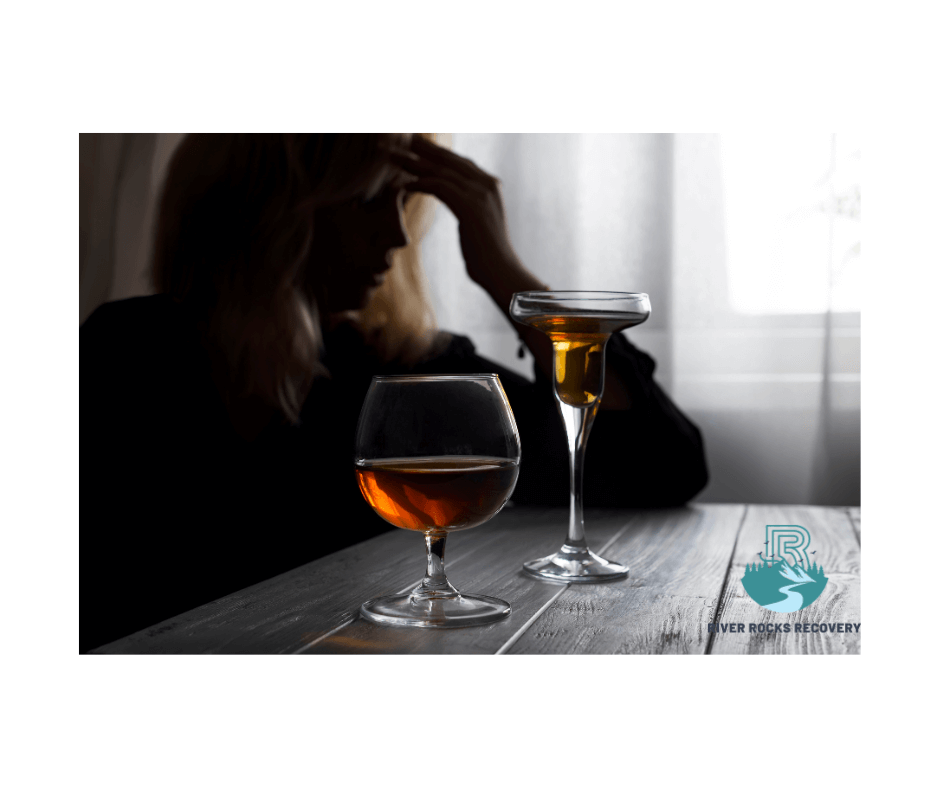Are you concerned about your drinking habits? Recognizing the signs of alcohol addiction can be challenging, but it’s a crucial step toward recovery. According to the National Institute on Alcohol Abuse and Alcoholism, an estimated 14.5 million Americans aged 12 and older had an alcohol use disorder in 2019. If you’re questioning your relationship with alcohol, it’s essential to understand the available treatment options. At River Rocks Recovery in Middletown, Ohio, we offer a range of addiction treatment programs, including Intensive Outpatient Programs (IOP), Partial Hospitalization Programs (PHP), and outpatient services. Take the first step and contact us today at (888) 905-6281.
Signs You Have a Drinking Problem
Lack of Control
One of the clearest signs of a potential drinking problem is an inability to control alcohol consumption. This could mean drinking more or for longer periods than intended, despite efforts to cut back. Spending excessive time obtaining, using, or recovering from alcohol’s effects is another red flag.
Increased Tolerance
Needing to drink greater amounts to achieve the same effects is a sign of increased tolerance, which can lead to alcohol dependence over time. Strong, persistent cravings or urges to drink often accompany tolerance. Increased tolerance can affect one’s mental health as well.
Neglecting Responsibilities
Failing to fulfill obligations at work, school or home due to repeated alcohol use is a major warning sign. Giving up important activities in favor of drinking can also indicate a growing problem.
Health Consequences
Continuing to drink despite negative impacts on physical health, such as liver disease or neurological complications, is a serious concern. Experiencing withdrawal symptoms like nausea or shakiness when not drinking is also problematic.
Physical and Behavioral Signs of Alcohol Addiction
Physical Signs
Many physical signs can indicate alcohol addiction. Unsteady gait, impaired coordination, memory lapses, and rapid heartbeat are common. Nausea, vomiting, and withdrawal symptoms like anxiety or seizures may also occur. Excessive drinking can severely damage organs like the liver, heart, and brain over time.
Behavioral Changes
Behavioral signs of alcoholism include impaired judgment, inappropriate conduct, mood swings, depression, and neglecting self-care. Problems at work, school, home, or by affecting relationships due to drinking are red flags, as is risking physical safety. Continuing to drink despite issues caused by alcohol is a key symptom. An unhealthy obsession with alcohol or craving drinks regularly can also indicate addiction.
Other Warning Signs
Other potential signs are: increased alcohol tolerance, withdrawal symptoms when not drinking, giving up activities to drink or recover, and being unable to limit intake. Seeking professional help is crucial, as untreated alcoholism can have grave health consequences and disrupt all aspects of life.

You Want to Stop Drinking But Can’t
The Struggle is Real
Battling alcohol addiction can be an overwhelming and isolating experience. The desire to quit drinking may be strong, but the grip of addiction can make it feel impossible. According to recent studies, over 14 million adults in the US struggled with alcohol addiction in 2022. You’re not alone in this fight.
Signs You Need Help
If you find yourself unable to control your drinking, experience cravings, increased tolerance, or withdrawal symptoms when not drinking, it may be time to seek professional help. River Rocks Recovery offers comprehensive alcohol rehab programs to address the physical, emotional, and psychological aspects of addiction.
Treatment Options for Alcohol Use Disorder
Seeking professional help is crucial for overcoming alcohol use disorder (AUD). At River Rocks Recovery, various evidence-based programs are offered, including:
Partial Hospitalization Program (PHP)
The most intensive option, a partial hospitalization program (PHP) involves daily treatment sessions and 24/7 medical supervision. This level of care helps stabilize individuals with severe AUD and co-occurring mental health issues.
Intensive Outpatient Program (IOP)
For those needing a flexible schedule, an intensive outpatient program (IOP) combines multiple weekly therapy sessions with continued independence. It focuses on building coping skills and relapse prevention strategies.
Outpatient Program (OP)
The least intensive option, an outpatient program provides weekly individual and group counseling sessions. It’s ideal for ongoing support and maintenance during later recovery stages.
Regardless of the program, River Rocks Recovery utilizes proven therapies like Cognitive Behavioral Therapy (CBT), Dialectical Behavior Therapy (DBT), and Mindfulness-Based approaches. Their personalized therapy treatment plans address the unique needs of each individual, fostering lasting sobriety.
Finding Sobriety Through Addiction Recovery Programs
Personalized Approach
The admission process involves an initial consultation to assess the individual’s needs and develop a personalized treatment plan. This ensures the appropriate level of care is provided, utilizing therapies like Cognitive Behavioral Therapy (CBT), Dialectical Behavior Therapy (DBT), and Relapse Prevention.
Affordable Care
River Rocks Recovery works with insurance providers and offers financial assistance options to make treatment accessible and affordable. According to a report, the average cost for substance abuse treatment in Ohio is $56,623, highlighting the importance of coverage and assistance programs.
Conclusion
As you reflect on your drinking habits, remember that recognizing a problem is the first step toward recovery. If you’ve identified signs of alcohol addiction in your life, know that you’re not alone. With over 14 million adults in the U.S. struggling with Alcohol Use Disorder, our alcohol rehab treatment program is available. River Rocks Recovery in Middletown, Ohio offers a range of programs tailored to your needs, including Intensive Outpatient (IOP), Partial Hospitalization (PHP), and standard outpatient care. By seeking help, you’re taking control of your future and paving the way for a healthier, more fulfilling life. Don’t hesitate to reach out at (888) 905-6281 – your journey to recovery starts today.




























